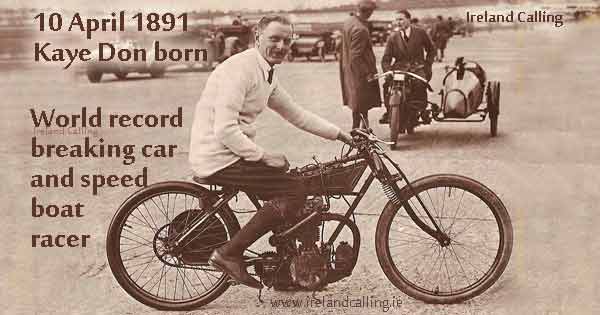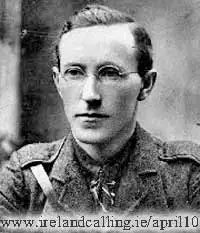april-top.html
1876 Alexander Turney Stewart died on this day in 1876. He was an Irish American entrepreneur, who became one of the richest men in the world with his pioneering ideas.
He used the money he inherited after his grandfather died to open his first shop in New York, and went on to revolutionise the retail industry.
Learn more about Alexander Turney Stewart

* * *
1891 Kaye Don was born in Dublin on this day in 1891. He was a racing driver, initially of cars, but later went on to race boats. At one point in his career, Don held the world speed record for both land and water. He was a popular character and regularly played down his achievements. In a 1931 speech he made to fans at the Empire Club, Canada he said: “One or two experiences that I have had have been somewhat thrilling.”
Don’s life was not without trouble though, in 1934 he was sentenced to four months in prison for the manslaughter of his friend and colleague Francis Tayler. Don had been driving a race car with Tayler in the passenger seat, to test its performance for an upcoming race, when he clipped another vehicle and crashed.
Don survived the accident but Tayler died of his injuries. Don was found guilty of causing death by negligent driving, as he knew the car had faulty steering, and he went out on the public roads with no lights despite it being late in the evening.

* * *
 1923 Liam Lynch died on this day in 1923, after being shot by Free State soldiers during the Irish Civil War. Lynch was a commander in the Irish Republican Army. He had rose through the ranks during the Irish War of Independence, and became a leader of the IRA when the organisation became split after the signing of the Anglo-Irish Treaty.
1923 Liam Lynch died on this day in 1923, after being shot by Free State soldiers during the Irish Civil War. Lynch was a commander in the Irish Republican Army. He had rose through the ranks during the Irish War of Independence, and became a leader of the IRA when the organisation became split after the signing of the Anglo-Irish Treaty.
Lynch was opposed to the treaty, as he felt it belittled the achievements of the Easter Rising, where Ireland was proclaimed as an independent republic. Under the terms of the treaty, Ireland had Dominion status, but still within the British Empire.
A civil war broke out between the pro-treaty faction of the IRA, now known as the Free State army, and the anti-treaty faction, the republicans. Lynch led the republicans in several attacks, as they tried to gain control of Ireland.
However, he was eventually killed while attempting to escape from about 50 oncoming Free State soldiers. Lynch and his team of six men, tried to flee up the Knockmealdown Mountains, but he was hit by a rifle shot fired from the road below. He had with him some important documents outlining future military strategies, which he knew could not fall into the hands of his enemies.
Lynch ordered his men to take the papers and flee, rather than try to save him. When the Free State soldiers climbed up to investigate, they thought they had shot Éamon de Valera. Lynch responded by saying:
“I am Liam Lynch, Chief-of-Staff of the Irish Republican Army. Get me a priest and doctor, I’m dying.”
The Free State soldiers carried him to a pub at the bottom of the mountains, and he was taken to hospital but died from his injuries. Frank Aiken took over as the head of the IRA and immediately called a ceasefire, so Lynch’s death effectively ended the Civil War.
Click here to read more about Irish history
* * *
1940 Happy birthday to Gloria Hunniford, who was born in County Armagh on this day in 1940. She is a journalist and presenter, and been a regular on British television since the 1970s.
Hunniford has presented light hearted shows such as This Morning and The One Show, and has also tackled more serious issues in documentaries Rip Off Britain and Doorstep Crime 999.
* * *
1992 The IRA bomb detonated a bomb in London’s financial district on this day in 1992. The explosion killed three people and injured several more. Despite a warning from the IRA, the police failed to completely evacuate the area on at 30 St Mary’s Axe, the site where the Gherkin, built in 2003, now stands.
* * *
1998 The Good Friday Agreement was signed on this day in 1998, by leaders of the British and Irish governments, and leaders of the Sinn Féin and the Progressive Unionist Party (PUP). The agreement was seen as a significant step towards ending the ‘Troubles’ in Northern Ireland.
april-bottom.html